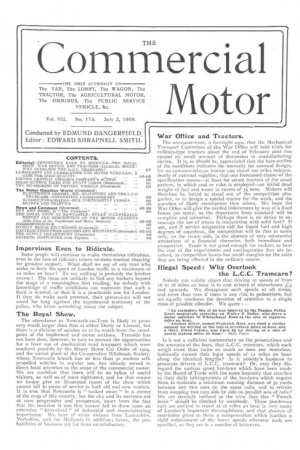Impervious Even to Ridicule.
Page 1

If you've noticed an error in this article please click here to report it so we can fix it.
Some people will continue to make themselves ridiculous, even in the face of ridicule; others mistake ironical cheering for genuine support. What shall we say of any mart who seeks to limit the speed of London traffic to a maximum of in miles an hour? To say nothing is probably the kindest course I IIis ideas are unlikely to find any backers beyond the stage of a meaningless first reading, for nobody with knowledge of traffic conditions can maintain that such a limit is wanted, or that it is a practicable one for London. If they do make such pretence, their pretensions will not stand for long against the experienced testimony of the police, who know something about the subject.
The Royal Show.
The attendance at Newcastle-on-Tyne is likely to prove very much larger than that at either Derby or Lincoln, but there is a division of opinion as to its worth front the standpoint of the implement and motor sections. Tyneside has not been slow, however, to turn to account the opportunities for a freer use of mechanical road transport which were zendered possible by the Heavy Motor Car Order of 1904, and the varied plant of the Co-operative Wholesale Society, whose Newcastle branch has no less than 30 modern selfpropelled vehicles in regular use, has already served to direct local attention to the scope of the commercial motor. We are confident that there will be an influx of useful visitors, as well as of mere sightseers, and for that reason we to-day give an illustrated report of the show which cannot fail to prove of service to both old and new readers. It is true that Newcastle is " tucked away " in a corner of the map of this country, but the city and its environs are at once progressive and prosperous, apart from the fact that the occasion is one that cannot fail to draw upon an extensive " hinterland " of industrial and manufacturing importance. We hear of many visitors from Lancashire, Yorkshire, and the Midlands in addition; hence, the probabilities of business are far from unsatisfactory.
War Office and Tractors.
The announcement, a fortnight ago, that the Mechanical Transport Committee of the War Office will hold trials for military-type tractors about the end of February next, has caused no small amount of discussion in manufacturing circles. It is, or should be, appreciated that the bare outline of the conditions indicates the necessity for unusual design, for no commercial-type tractor can travel so° miles independently of external supplies ; that one forecasted clause of the specification means—at least for steam tractors of the usual pattern, in which coal or coke is employed—an initial dead weight of fuel and water in excess of 31 tons. Makers will therefore be forced to stand out of the competition altogether, or to design a special tractor for the work, and the question of likely recompense then arises. We hope the War Office will give the needed inducement by way of a fixed bonus per entry, as the departures from standard will be complete and universal. Perhaps there is no desire to encourage the use of steam in conjunction with solid fuel? If not, and if service exigencies call for liquid fuel and high degrees of superheat, the competition will be that in name only, on the steam side, in the absence of very substantial attractions of a financial character, both immediate and prospective. Trade is not good enough for makers to bear the cost of the experiments and contingencies that are involved, as competition leaves but small margins on the sales that are being effected in the ordinary course.
Illegal Speed : Why Overlook the L.C.C. Tramcars?
Nobody can validly object that driving at speeds of from 16 to 18 miles an hour is to cost drivers of motorbuses Ls and upwards. We disapprove such speeds at all times, and more than ever if there is any risk to pedestrians, but we equally condemn the devotion of attention to a single class of possible offender. We quote :— " An exemplary fine of £6 was impofed by the Thames Police Court magistrate yesterday on Waltir E, Buller, who drove a motor omnibus in Whltechapel Road at the rate of eighteen miles an hour.
" Another driver, named Frederick Bare, was fined a similar amount for driving at the rate of seventeen miles an hour, and a third, Alfred Franks, was fined 15 for driving at a rate of nearly sixteen miles an hour.' —Daiiii Paper Is it not a sufficient commentary on the prosecutions and the amounts of the fines, that L.C.C. tramcars, which each weigh more than twice as much as does any motorbus, habitually exceed their legal speeds of 12 miles an hour along the identical lengths? Is it nobody's business to prosecute drivers of L.C.C. tramcars? Or, may they disregard the various speed bye-laws which have been made by the Board of Trade with the same impunity that attaches to their daily infringements of the bye-laws which require them to maintain a minimum running distance of so yards between any two cars on the same rails, and to refrain from stopping two cars side by side on parallel sets of rails? We are strongly inclined to the view that this " French leave" should he checked by somebody. These ponderous cars are entitled to travel at 16 miles an hour in very many of London's important thoroughfares, and that absence of restriction gives to them a compensation which justifies a rigid enforcement of the lower speeds wherever such arw specified, as they are in a number of instances.
































